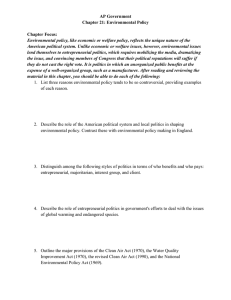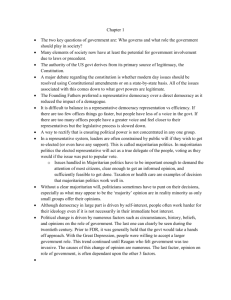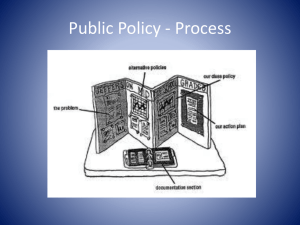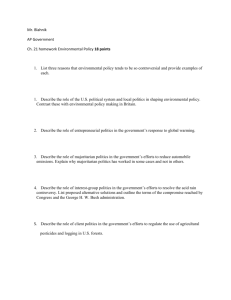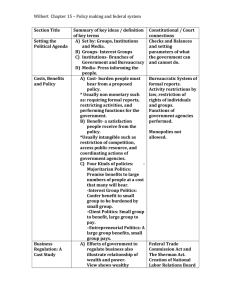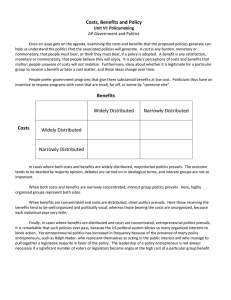Wilson 21 - SteveTesta.Net
advertisement
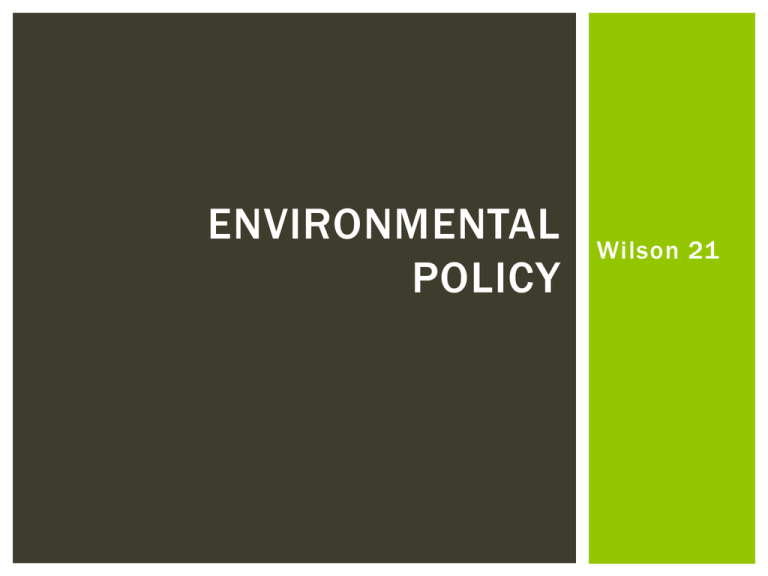
ENVIRONMENTAL POLICY Wilson 21 OBJECTIVE QUESTIONS Who Governs? Why have environmental issues become so important in American politics and policy-making? Does the public get the environmental laws it wants? To What Ends? If we wish to have cleaner air and water, how far should we go in making them cleaner when the cost of each additional gain goes up? What is the best way for the government to achieve an environmental goal: by issuing orders or offering incentives? CONTROVERSY Policies create winners and losers Enmeshed in scientific uncertainty Mobilizes decision-makers with strong, emotional appeals Policies af fect states and other nations Majoritarian appeal Entrepreneurial pressure Client benefits Interest group fights AMERICAN CONTEXT Policy is much more adversarial than it is in most European nations Conflicts, lawsuits, antagonistic – US Business and politics work together, flexible – GB Local politics plays larger role Dependent on states to enforce rules “science” plays larger role elsewhere ENTREPRENEURIAL Global Warming Earth Day, 4/22/1970 Public ground swell Cuyahoga River EPA Clean Air Act Water Quality Improvement Act Endangered Species Act Modern arguments Conflicts between elites over ideologies MAJORITARIAN Pollution Started as entrepreneurial Became majoritarian when localities had to meet air quality standards Local rules Smog control Export competition More targeted since the 1990s NEPA – environmental impact studies, low cost Gas tax – public push back when costs too high INTEREST GROUP Acid Rain High sulfur, coal burning power plants Natural resources and tourism 2 powerful lobbies Scientific uncertainty Scrubbers added to smokestacks Carbon tax and offset market Political stalemates More groups Less fervent than entrepreneurial Less deep than majoritarian CLIENT POLITICS Pesticides Organized farmers Balance costs and benefits Too many to test them all DDT as example of winning entrepreneurial public campaign EPA challenges Affects not clear cut Public opinion changes Strategies to reach goals Command-and-control Offering incentives UNCERTAIN SOLUTIONS What is the problem? What are the goals? How do we achieve our goals? Offsets – close a polluting factory to open another Bubble Standard – meeting total pollution goals Allowances or Banks – saving or selling credits Superfund example and shift away from rules Tax and sue toxic waste dumpers Who is responsible Expensive clean-up Expansion of sites and standards RESULTS High support for environment General agreement over degeneration Disagreement over problems and solutions Considerable improvements in air quality Some improvements in water quality Little gains in hazardous waste and pesticide use
